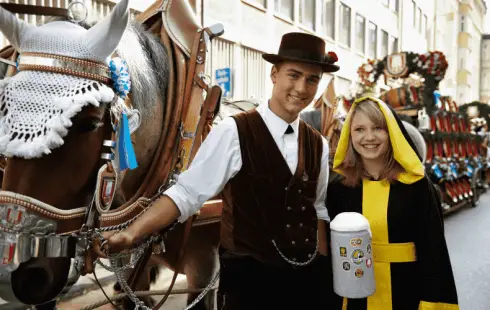
Oktoberfest in the news: How people around see beer's birthday
Section: Arts
 Munich, a city renowned for its rich history and cultural heritage, houses the Munich Kindl within the confines of the Rathaus at Marienplatz. In various forms, this iconic figure can be found throughout the cityscape, from the city crest adorning gateways to frescoes within the stairwell and high atop the Rathaus tower. Recent events have further solidified the significance of the Munich Kindl, as FC Bayern players proudly display its image on their away jerseys, showcasing their affection for this timeless emblem.
Munich, a city renowned for its rich history and cultural heritage, houses the Munich Kindl within the confines of the Rathaus at Marienplatz. In various forms, this iconic figure can be found throughout the cityscape, from the city crest adorning gateways to frescoes within the stairwell and high atop the Rathaus tower. Recent events have further solidified the significance of the Munich Kindl, as FC Bayern players proudly display its image on their away jerseys, showcasing their affection for this timeless emblem.
Origins and Evolution
The Munich Kindl has deep historical roots, with Munich itself first documented as "Munichen" in 1158. The origins of the emblem are intertwined with the city's connection to Schäftlarn Monastery, as well as its phonetic similarity to the Latin word for "monk." The speaking city crest, featuring a monk, emerged during the 13th century. Initially portrayed as a bust, it evolved into a full representation from head to toe, clutching an Evangelium book with a blessing gesture. The monk remains a steadfast component of the city's crest to this day.
In 1957, a standardized Munich Kindl design, conforming to specific graphical guidelines, became the official emblem of all municipal offices and institutions. Over the centuries, the depiction of the Munich Kindl transformed from an adult monk to a youthful figure. It underwent transitions between being portrayed as both a boy and a girl until the 1920s, when the female representation of the Kindl solidified.
Endearing Appearances and Evolutions
The year 1847 marked a pivotal moment in the Munich Kindl's enduring legacy. Captured in a drawing by painter Kaspar Braun, the Munich Kindl stepped out from the confines of the city crest to become a mascot and an independent advertising icon. From that point onwards, its appearances multiplied significantly.
The Munich Kindl effortlessly adapts to its surroundings. It has adorned itself with a beer stein to celebrate the thriving Munich brewing culture, and it became the friendly face of tourism promotion through postcards and souvenirs around 1890. The Munich Kindl also showcased its global inclusivity during the "Exhibition Munich 1910: Masterpieces of Islamic Art," where it accompanied an Arabic musician on a guitar, sporting an oriental Fez.
The Kindl's Circle of Fame
Famous Munich-born individuals, referred to colloquially as "Münchner Kindl," include historical figures like Emperor Franz Joseph I and King Ludwig II. Composer Richard Strauss, painters Carl Spitzweg and Franz Marc, and prominent figures such as Charlotte Knobloch, President of the Israelite Religious Community of Munich and Upper Bavaria, tenor Jonas Kaufmann, footballers Philipp Lahm and Franz Beckenbauer, Tatort detective Udo Wachtveitl, and actor Elyas M'Barek are among its ranks.
Viktoria Ostler: A Modern Munich Kindl
In a contemporary twist, 27-year-old Viktoria Ostler holds the esteemed position of the official Munich Kindl since 2016. Leading the procession of Oktoberfest hosts and the famous Trachten- und Schützenzug parade on horseback, Viktoria embodies the spirit of the Munich Kindl tradition. As a skilled equestrian, she cherishes the moment she mounts her horse on the first Saturday of the festival, signaling the commencement of the festivities.
A Modern Marvel and a Historic Ritual
In a contemporary move, FC Bayern has globally displayed the Munich Kindl on their away jerseys, elevating its status on the international stage. Meanwhile, a cherished tradition continues within the Munich Rathaus. At precisely 9:00 PM each evening, the Munich Kindl is put to rest in a secret chamber adjacent to the Glockenspiel tower. For those eager to experience this unique ritual, the Munich Kindl Tour offers an opportunity to explore the city's hidden treasures with a Munich original, culminating in the spectacle of the Munich Kindl's nightly slumber.
As the Munich Kindl continues to evolve through history, it remains an enduring symbol of Munich's cultural identity and pride, reflecting both tradition and the city's forward-looking spirit.
Photo Bierkutscher und Muenchner Kindl, © Muenchen Tourismus, Frank Bauer

Section: Arts

Section: Business

Section: Business

Section: Arts

Section: Health

Section: Arts

Section: News

Section: News

Section: Arts

Section: Business
Health Insurance in Germany is compulsory and sometimes complicated, not to mention expensive. As an expat, you are required to navigate this landscape within weeks of arriving, so check our FAQ on PKV. For our guide on resources and access to agents who can give you a competitive quote, try our PKV Cost comparison tool.
Germany is famous for its medical expertise and extensive number of hospitals and clinics. See this comprehensive directory of hospitals and clinics across the country, complete with links to their websites, addresses, contact info, and specializations/services.
One of the most beautiful squares transforms into a summer stage every year for two days. The Gärtnerplatz Open-Air features a free music and cultural program across three stages, as well as street food from local vendors. On Saturday, the main stage at Gärtnerplatz offers something for everyone,...



No comments yet. Be the first to comment!